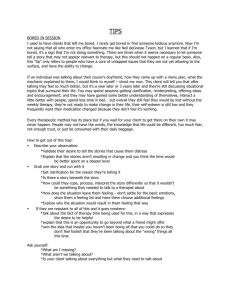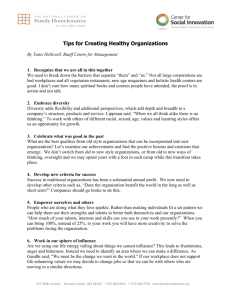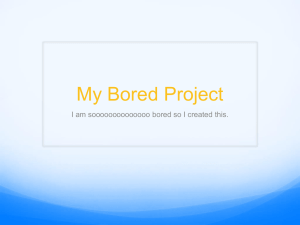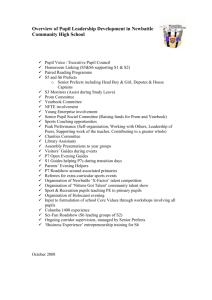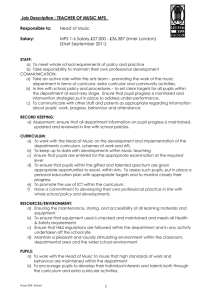Joy 1: What do you enjoy doing – and why
advertisement
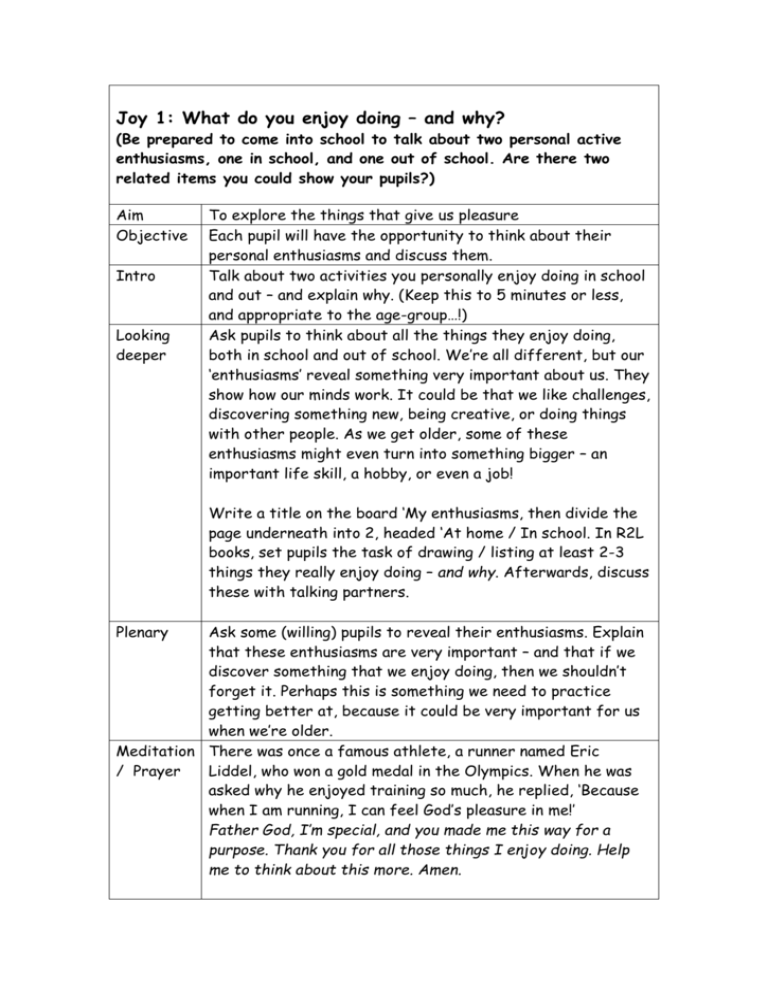
Joy 1: What do you enjoy doing – and why? (Be prepared to come into school to talk about two personal active enthusiasms, one in school, and one out of school. Are there two related items you could show your pupils?) Aim Objective Intro Looking deeper To explore the things that give us pleasure Each pupil will have the opportunity to think about their personal enthusiasms and discuss them. Talk about two activities you personally enjoy doing in school and out – and explain why. (Keep this to 5 minutes or less, and appropriate to the age-group…!) Ask pupils to think about all the things they enjoy doing, both in school and out of school. We’re all different, but our ‘enthusiasms’ reveal something very important about us. They show how our minds work. It could be that we like challenges, discovering something new, being creative, or doing things with other people. As we get older, some of these enthusiasms might even turn into something bigger – an important life skill, a hobby, or even a job! Write a title on the board ‘My enthusiasms, then divide the page underneath into 2, headed ‘At home / In school. In R2L books, set pupils the task of drawing / listing at least 2-3 things they really enjoy doing – and why. Afterwards, discuss these with talking partners. Plenary Ask some (willing) pupils to reveal their enthusiasms. Explain that these enthusiasms are very important – and that if we discover something that we enjoy doing, then we shouldn’t forget it. Perhaps this is something we need to practice getting better at, because it could be very important for us when we’re older. Meditation There was once a famous athlete, a runner named Eric / Prayer Liddel, who won a gold medal in the Olympics. When he was asked why he enjoyed training so much, he replied, ‘Because when I am running, I can feel God’s pleasure in me!’ Father God, I’m special, and you made me this way for a purpose. Thank you for all those things I enjoy doing. Help me to think about this more. Amen. Joy 2: Making my play more enjoyable Aim Objective To think about the choices we have for enjoying free time. Each pupil will have the opportunity to think about alternative playground activities. Intro Enjoy the chance to play at having a little rant about being bored: eg: ’I’m bored! I’m bored with this classroom, I’m bored with this chair, I’m bored with these walls, I’m bored with children, I’m bored with… ’ Then ask ‘What does it mean when we say we’re bored? Discuss in pairs, then feedback and display answers. Draw out the fact that ‘boredom’ is usually to do with being tired of something being the same. Have you ever felt like that? You might be in the classroom Looking in a particular lesson, or in the playground, or at home…and deeper you say ‘I‘m bored!’ That’s good, because you are starting to notice things – but what do you do with it? If someone felt bored in the playground, then what sorts of things might they do next? Discussion in pairs, then feedback. Draw out the choices: we can choose to carry on moaning, or to do something different. Often, the lazy way to stop being bored is to be negative, by trying to damage something or hurt somebody else’s feelings. The creative way is to come up with something new to do or be - and it’s a lot more fun. In pairs, list in R2L books as many different playground games and activities as possible. Plenary Feedback, with teacher listing all the possibilities for display. Are there any surprises? Draw out the idea that actually, we have more choices for enjoying ourselves than we realise - but we have to think about it! Also point out that some playground games stop being fun when people get aggressive with each other – that’s the lazy way again! We can choose to enjoy life in all sorts of different ways if we think about it! Meditation Eyes shut – imagine yourself playing something different this / Prayer playtime. Prayer: Father God, thank you for giving me the ability to choose. Help me to try thinking a little differently about how to use my playtimes. Challenge: try something different this week at playtime! You may be surprised! Joy 3: ‘Enjoyment’ vs. ‘Fun’ (For this, you need to demonstrate a personal skill you enjoy: juggling? Playing a musical instrument? Knitting? Drawing? Mental Maths? Writing a poem dramatically? Telling a funny story?) Aim To explore how enjoyment is something that has to be worked at. Objective Each pupil will have the opportunity to reflect on a skill that they can develop further. Intro Demonstrate a personal skill. Tell the story of how you first learned it, including the pitfalls and difficulties, and who helped you to improve – and say what you like about doing it. Looking Ask: If we said somebody was genuinely talented, then what deeper would that mean? Ask for and list the names of some famous people with the headings ‘Famous People’ and ‘Talented for What?’ on the board. Try to include people with a range of talents – sport, music, art, technological, managerial, compassion… and not just celebrities. Explain that although everybody is born with a range of talents, but we don’t naturally get better at them unless we persevere with them. Somebody once said that ‘Being a Genius is 10% Inspiration, and 90% Perspiration!’ : having a natural talent isn’t enough to make you really good at something – you need to take it further! We have to practice our skills and learn new ones from other people who are already good at it. Add that Enjoyment requires effort from you – unlike ‘having fun’, which is instant and easy. In pairs, decide on a common game or activity to talk about, and make it the title in their R2L books. What skills or knowledge do you need to have to become very good at it? How would you go about acquiring those skills or knowledge? In the centre of the page, draw something associated with that game or activity. Around it, write or draw the things that will help someone to become a real expert. Plenary Feedback pupil responses. Ask pupils if they have a talent they want to develop. Meditatio Shut your eyes, and imagine yourself being really good at your n talent. Imagine what it would feel like! Father God, I want to / Prayer become really talented about something. Show me how to do that, and give me the courage to persevere with it when I get tired. Amen. Joy 4: Enjoying being me Aim Object ive Intro Looking deeper Plenary Medita tion / Prayer To explore how we can develop our enthusiasms into something really useful or enjoyable in future. Each pupil will have the opportunity to consider what their enthusiasms reveal about their future abilities. Show or draw a packet of seeds. Explain that seeds are usually very small and hard to tell apart unless you are a real expert. Ask how we use seeds. Explain that we are all born with a variety of skills and talents – and when we are young, they work like seeds that could grow up to be something really interesting! The trick is to identify the ones which are really important. In pairs, pupils discuss their talents: things they are good at and enjoy doing, both in and out of school. Feedback, asking when they first found out they were good at it. Emphasise that social skills like ‘Being a good friend’ and ‘Being able to sort out peoples’ problems’ are also important talents. Pupils unsure of their talents should be asked: ‘What do you enjoy doing most of all?’ and drawn out in further individual discussion. Explain that some talents could be very useful as we grow older. A person who enjoys playing with others will be good at working with others. If you like drawing, you could be good at designing or making things. If you’re good with words or numbers, you might be using them to do something important one day. Ask: how are you going to develop these talents? Explore this, using R2L books. Draw a plant pot at the bottom of the page, and add a growing plant. Label it with your skill or talent. Next to it draw a watering can, the Sun and a box marked ‘Fertiliser.’ Label these with the things you will need to do to develop your natural talent further. Turn this into a tree, add flowers or fruit, and label them with the things this talent could turn into. Feedback pupil ideas about their talents and ambitions. Ask each child to cup their hands, and shut their eyes. Ask them to imagine their talents as seeds resting in their hands. Imagine letting it fall to the floor, then picking it up and holding it in a fist – and then opening the hand, letting it feel the sun’s warmth. Say that a talent is something you can forget (drop) keep to yourself (the fist), or something you can share with others (open). What do you want to do with your talent – bury it, keep it to yourself, or share it? Father God, you made me for a purpose. Help me to find out what that purpose is. Help me to use my talents well. Amen.

